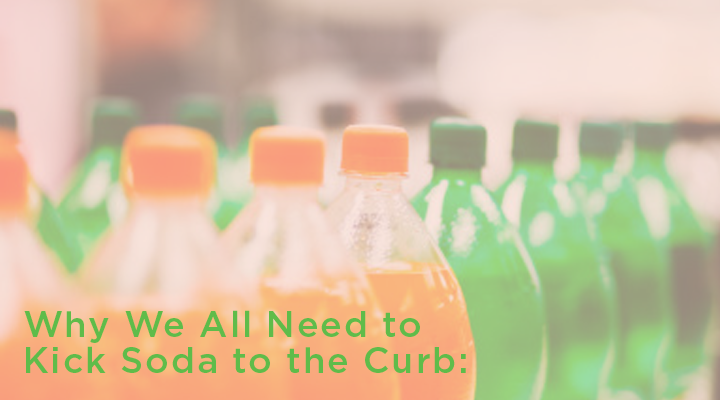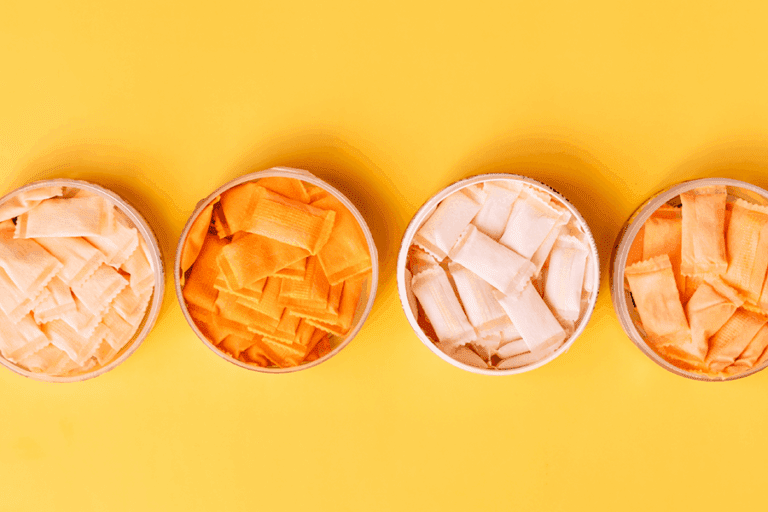Soda is one of the top sources of “energy” kids ages 2 to 18 years old are consuming. We call the energy gained from soda “empty calories” because they provide the opposite of what a nutrient-dense food would. The added sugars in soda are associated with a range of chronic diseases: obesity, type 2 diabetes, cardiovascular disease, and cavities. If you drink soda, we hope these 5 facts to kick your soda habit will help you consider ditching the drinks.
-
Sugar in soda contributes to cavities:
Depending on the size of your soda, one bottle contains anywhere from 1 to 2.5 servings. One study found that for each additional sugary drink serving you consume in one day, your risk of developing cavities increases by 22%. Cavities are 100% preventable. But, when we consume things like soda, we put ourselves at risk unnecessarily. Even when proper dental care is practiced, soda can wreck enamel.
Soda has anywhere from 20 to 70 grams of sugar per serving. The World Health Organization (WHO) and the American Heart Association (AHA) both recommend daily sugar intakes of 25 grams for women and 38 grams for men.
-
Soda contributes to plaque:
Sodas add layers of sugar to your teeth that promote the growth of plaque. Plaque is a sticky, colorless film of bacteria that forms on teeth. The bacteria that are naturally present in our mouth consume the sugar we drink (or eat). Then, they excrete a powerful acid. This is why the build-up of plaque contributes to tooth decay. Plaque can also develop on the tooth roots under the gum line. If left untreated, it can cause further problems like a breakdown in the bone supporting the tooth.
-
Enamel erosion from the acid in soda:
Did you know that enamel is the hardest substance in the body? It’s harder than bone! But, almost anything will begin to break down when it lives in an unfavorable environment. Many soft drinks have an acidity that approaches the level of battery acid.
When cavity bacteria are present in the mouth, they colonize on enamel, form dental plaque, and begin metabolizing carbohydrates for fuel. When you have sugars like sucrose and fructose left over on your teeth, you’re giving the bacteria energy to continue eating. The bacteria produce acid as a result of this. The levels of acidity in your mouth rise, lowering the pH of saliva. This takes a toll on enamel and begins to dissolve the minerals out of your teeth.
Research has found that when the pH drops below 5.5 for long periods or repeatedly, there is a significant chance of developing a cavity in the enamel. For reference, lime juice has a pH of 2.1 and spring water has a pH of 7.4. The lower the number, the higher the acidity.
This article from the American Dental Association documents your favorite sodas as extremely erosive, erosive, or minimally erosive. 39% (or 149 out of 379 beverages tested) were considered “extremely erosive” with a pH of under 3. Soda today is “one of the most significant dietary sources of acid capable” of breaking down our enamel.
-
Soft drinks can lead to tooth discoloration:
Dark sodas and colas have a history of staining teeth. Highly acidic drinks (including sports or energy drinks) may stain your teeth as they break down the tooth’s enamel. Because enamel is porous, it can absorb the color of the beverage or food you’re consuming.
-
Soda compromises your overall health:
You may be asking yourself if all this applies to diet sodas. It does. Diet sodas are still highly acidic and put your mouth at risk. When you drink one or more sodas throughout the day, you bathe your teeth in sugar and acid. The effects would be less invasive if you drank the soda in 10 minutes, rinsed with water, and followed up with brushing after. But, that’s not how many of us drink. Ask yourself, do you open a soda at work and sip it at your desk, only to finish it after an hour has gone by?
Oral health professionals agree that the “consumption of sugar and sugary drinks is a strong risk factor for dental erosion and cavities.” Soda negatively impacts more than our teeth. Drinking soda habitually is linked to obesity, tooth decay, and more problems. Certain types of cancer are linked to sugar intake, as well as depression and anxiety. If you’re feeling any symptoms of sluggishness or anxiety, try removing soda from your daily regimen.
Looking for soda alternatives?
There are many healthier alternatives with little to no sugar that can aid in your transition. Consider flavored sparkling water as a replacement. Sparkling waters come in a variety of flavors, and many are sugar-free and much less acidic than sodas.
Be wary of any ingredients ending in “-ose.” These are also types of sugar and include:
- Sucrose
- Glucose
- Dextrose
- Fructose
- Lactose
Fruit-infused water is another way to get your daily dose of water with a flavorful spin on it. Herbs, citrus, fruits, and veggies (like cucumber) make fantastic additions.
Work on upping your daily water and milk intake. Research shows that individuals who drink soda are not only faced with the oral health risks, but they also consume less water and milk, which have restorative properties.
Looking for more ways to cut down on sugar? Check out:

![The World Health Organization recommends 25 grams of sugar a day for women and 38 grams for men. The average can of soda has twice that.]](https://deltadentalwiblog.com/wp-content/uploads/2019/05/sugar-in-soda-720.png)


